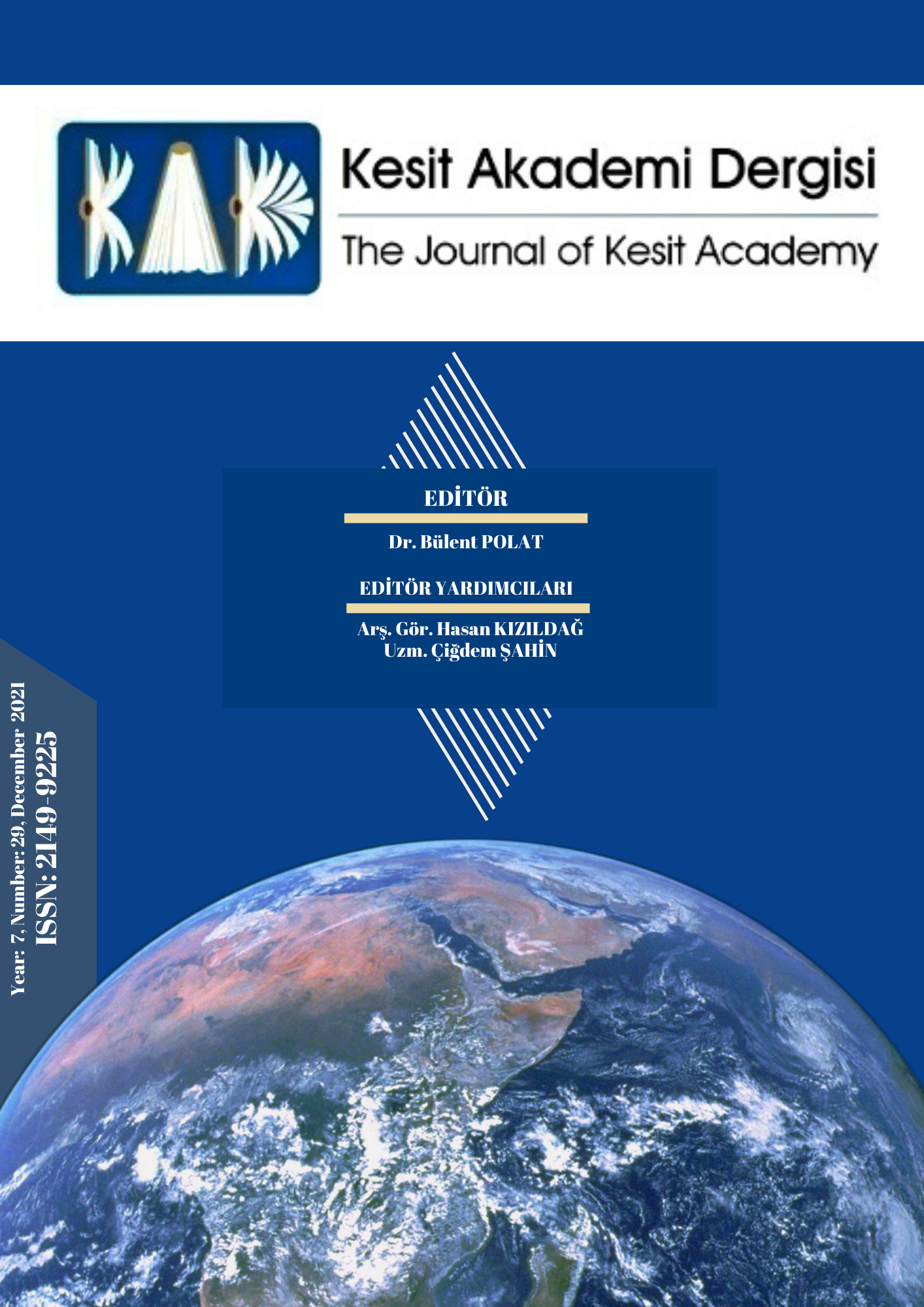Covid-19 Salgın Sürecinin İlk, Orta ve Yükseköğrenime Etkilerinin Çok Kriterli Karar Verme ile Değerlendirilmesi: Avrupa Birliği Örneği
Author :
Abstract
2019 yılı Aralık ayında ilk olarak Wuhan/ Çin’de ortaya çıkan Covid-19 salgını, 2020 yılı ilkbaharından itibaren tüm dünyayı etkisi altına almıştır. Avrupa Birliği’nin de hem topluluk olarak hem de tekil ülkeler bağla-mında salgından oldukça etkilendiği gözlenmiştir. Covid-19 salgını ya-şamın her alanında olduğu gibi eğitim-öğretim sistemini de etkilemiştir. Salgınla mücadele sürecinde virüsün yayılımını engellemek amacıyla ülkelerin eğitim alanında uygulamaya koyduğu okulların geçici olarak kapatılması ve uzaktan eğitim aracılığıyla eğitime devam edilmesi gibi tedbirlerin ülkelerdeki eğitim-öğretim faaliyetlerini ve eğitimle alakalı bazı sosyo-ekonomik değişkenleri de etkilediği aşikârdır. Bu bağlamda, çalışmada AB Ülkelerinde, salgın öncesi dönemi temsil eden 2019 yılı ve salgının yayıldığı 2020 yılına ait çeşitli eğitim göstergeleri kullanılarak Covid-19 salgın sürecinin ilk, orta ve yükseköğrenime etkileri araştırılmıştır. Çalışma kapsamında ele alınan değişkenler; eğitim-öğretimden erken yaşta ayrılanlar, işsiz ve eğitim-öğretim görmeyen 15-24 yaş arası gençler, 24 yaş üzeri yetişkinlerin öğrenime katılımı, yükseköğretime devam, yeni mezunların istihdam oranı, en fazla ortaokul eğitimi alanlar ve en azından lise eğitimi almış kişilerdir. Çalışmanın uygulama kısmında Çok Kriterli Karar Verme (ÇKKV) yöntemlerinden MOORA ve VIKOR yöntemleri kullanılarak belirlenen eğitim göstergelerine göre 2019 ve 2020 yılları için 27 AB ülkesinin sı-ralaması yapılmış ve ülkelerin durumları değerlendirilmiştir.
Keywords
Abstract
The Covid-19 epidemic, which first appeared in Wuhan / China in December 2019, has affected the whole world since the spring of 2020. It has been observed that the European Union has been highly affected by the epidemic both as a community and in the context of individual countries. It is obvious that measures in the field of education in order to prevent the spread of the virus during the fight against the epidemic such as the temporary closure of schools implemented by countries and the continuation of education through distance education also affect the educational activities furthermore some socio-economic variables related to education. In this context, the effects of the Covid-19 epidemic process on primary, secondary and higher education were investigated by using various educational indicators of 2019, which represents the pre-epidemic period, and 2020, when the epidemic spread. Variables handled within the scope of the study are early leavers from education, young people neither in employment nor in education and training aged 15-24, adult participation in learning over 24, tertiary educational attainment, employment rates of recent graduates, at most lower secondary educational attainment and at least upper secondary educational attainment. In the application part of the study, 27 EU co-untries were ranked for the years 2019 and 2020 according to the education indicators determined by using the Multi-Criteria Decision Making (MCDM) methods MOORA and VIKOR and the status of the countries was evaluated.
Keywords
- Bolat, B. A. (2011). Eğitim göstergeler açısından Türkiye ve Avrupa Birliği’ne üye ülke- lerin karşılaştırılması. Yönetim, 22(69). 61-77.
- Brauers, W. K. ve Zavadskas, E. K. (2006). The MOORA method and its application to privatization in a transition economy. Control and Cybernetics, 35, 445-469.
- Çakmak, Ö. (2008). Eğitimin ekonomiye ve kalkınmaya etkisi. Dicle Üniversitesi Ziya Gökalp Eğitim Fakültesi Dergisi, (11), 33-41.
- Ertürk, S. (1972). Eğitimde program geliştirme. Yelken Tepe Yayınları.
- Glewwe P. ve Kremer M. (2006). Schools, teachers, and education outcomes in develo- ping countries. Handbook of the Economics of Education, 2, 945-1017.
- Gültekin, M. ve Şengül, S. A. (2006). Avrupa birliğinin eğitimde kaliteyi belirleyici alan ve göstergeleri açısından Türk eğitim sisteminin durumu. Sosyal Bilimler Dergisi, 6(2), 145 - 170.
- Ju, Y. ve Wang, A. (2013). Extension of VIKOR method for multi-criteria group decision making problem with linguistic information. Applied Mathematical Modelling, 37 (5), 3112-3125.
- Opricovic, S, ve Tzeng, G. H. (2004). Compromise solution by MCDM methods: A comparative analysis of VIKOR and TOPSIS. European Journal of Operational Research, 156 (2), 445-455.
- Opricovic, S. ve Tzeng, G. H. (2007). Extended VIKOR method in comparison with out- ranking methods. European Journal of Operational Research, 178 (2), 514-529.
- Öz, B., Taban, S., Kar, M. (2009). Kümeleme analizi ile Türkiye ve AB ülkelerinin beşeri sermaye göstergeleri açısından karşılaştırılması. Eskişehir Osmangazi Üniversitesi Sosyal Bilimler Dergisi, 10(1), 1-29.
- Sağlam, M., Özüdoğru, O. F. ve Çıray, F. (2011). Avrupa Birliği eğitim politikaları ve Türk Eğitim Sistemi’ne etkileri. Yüzüncü Yıl Üniversitesi Eğitim Fakültesi Dergisi, 8 (1), 87-109.
- Taş, Ç. K. ve KAR, S. Ö. (2017). Faktör analizi yöntemi ile Türkiye ve Avrupa Birliği üyesi ülkelerin sosyo-ekonomik göstergeler bakımından gelişmişlik düzeylerinin karşılaştırılması. Çukurova Üniversitesi Sosyal Bilimler Enstitüsü Dergisi, 26(3), 60-77.
- Telli-Yamamoto G. ve Altun, D. (2020). Coronavirüs ve çevrimiçi (online) eğitimin ön- lenemeyen yükselişi. Üniversite Araştırmaları Dergisi, 3 (1), 25-34. Doi: 10.32329/uad.711110.
- Tuzcu, G. (2002). Avrupa Birliğine geçiş sürecinde Türk eğitiminin planlanması. Milli Eğitim Dergisi, 155-156.
- Türe, H., Doğan, S., & Koçak, D. (2019). Assessing Euro 2020 strategy using multi- criteria decision making methods: VIKOR and TOPSIS. Social Indicators Research,
- Veiderpass, A. ve McKelvey, M. (2016). Evaluating the performance of higher educa- tion institutions in Europe: a nonparametric efficiency analysis of 944 institutions. Applied Economics, 48(16), 1504-1514.
- Yaralıoğlu, K. (2010). Karar verme yöntemleri. Detay Yayıncılık.





